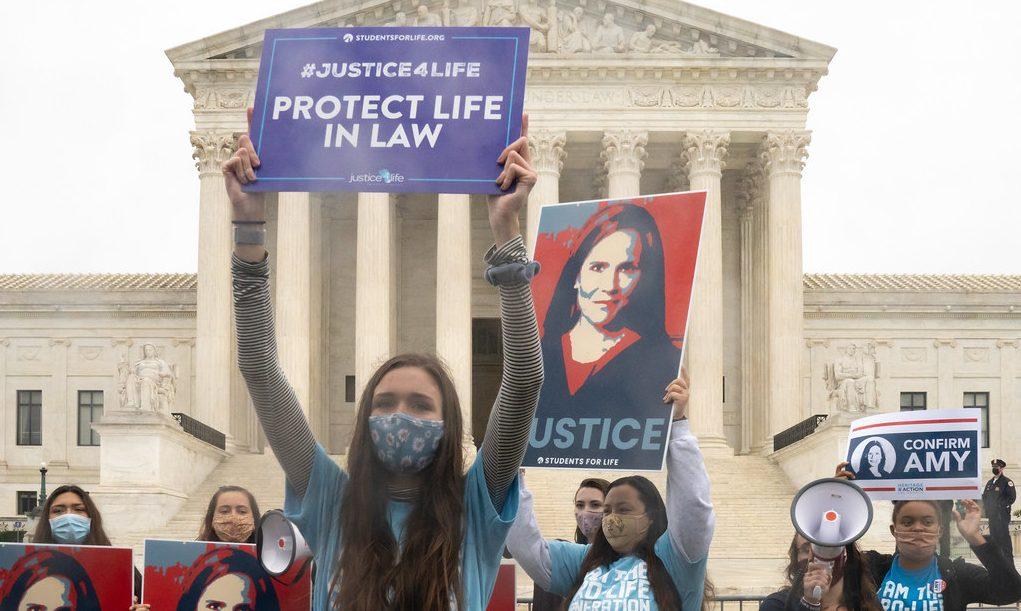The appointment of a Supreme Court Justice is always monumental, not only because their appointment is for life, but also because of the consequences their decisions might make on the American people. Ruth Bader Ginsburg’s passing in late September prompted an immediate response by President Trump to push through another conservative candidate, Judge Amy Coney Barrett, before the election on Nov. 3.
Much goes into the process of seating a Supreme Court Justice. Tens of thousands of documents must be vetted by both parties to ensure that there are no papers, actions, or decisions that would disqualify a candidate from the highest court in the country. Democrats feel that there is not sufficient time to go through this procedure and with people voting for the past two weeks, it seems improper for a president to push through a nomination when there is a possibility that a new president will be elected in November.
As the Supreme Judiciary Committee approved Barrett’s nomination on Thursday, and the full Senate vote is set to arrive on Monday, the controversy of the historical event rises. The results of a Politico poll show that 51% of voters think that Barrett should be confirmed before the election and 28% think that appointment should be made by the winner after the election, while 21% responded that they don’t have an opinion on the issue.
Senate Democrats boycotted Thursday’s vote on the nomination to the Supreme Court. “Throughout the hearings last week, committee Democrats demonstrated the damage a Justice Barrett would do – to health care, reproductive freedoms, the ability to vote, and other core rights that Americans cherish,” Senate Minority Leader Chuck Schumer and Democrats on the Senate Judiciary Committee said in a statement announcing their boycott. “We will not grant this process any further legitimacy by participating in a committee markup of this nomination just twelve days before the culmination of an election that is already underway.”
Something that has been heavily brought into the debate is the argument that occurred in 2016 over then-President Barack Obama’s nomination of Merrick Garland after the death of conservative Justice Antonin Scalia. Mere hours after Scalia’s death had been announced, and before Obama had named Garland, Senate Majority Leader Mitch McConnell stated that any appointment made by the sitting president was null and void; the next Supreme Court Justice should be chosen later that year by the new president.
“Remember that in 2016 they didn’t just vote against the President’s nominee—they refused to hold a hearing or a vote at all,” Pete Buttigieg, former 2020 Democratic Presidential candidate, said on Twitter.
On Saturday, Oct. 17, U.S. Senate member Lindsey Graham penned on Twitter that he will support Trump in his endeavors regarding the recent vacancy created by the passing of Justice Ginsburg. Since the post, Democrats such as Chuck Schumer have called him out on hypocrisy because of his statement, “I want you to use my words against me. If there’s a Republican president in 2016 and a vacancy occurs in the last year of the first term, you can say Lindsey Graham said let’s let the next president, whoever it might be, make that nomination,” over the nomination of Garland in 2016.
Democrats asserted that Graham broke a Judiciary Committee rule today, which states that two members of the minority party must be present “for the purpose of transacting business.” But Republicans rebutted that another superseding Senate rule states that only a majority of the committee needs to be physically present to report out the nominee. The Democrats, in protest, boycotted the event, and in their seats, put photos of people who will be in jeopardy of death if they lose their access to affordable healthcare. Amy Coney Barrett has made her stance very clear about her disdain for the Affordable Care Act. During the hearing this week, basic Constitutional questions were asked of the nominee and she was vague in all of her responses, answers that truly were not up for interpretation.
While Barrett is on track for confirmation, the hearings last week were remarkable for one reason: her refusal to weigh in on rather clear legal issues and comment on basically anything relating to Trump. She declined to answer questions concerning what is and isn’t legal, all of which are specifically outlined in the United States Constitution.
When the vote comes in front of the Senate on Monday, Amy Coney Barrett will be confirmed unless there are enough Republicans who do not vote to push through the nomination. Thus far, Senators Susan Collins and Lisa Murkowski have said they would not vote to confirm this candidate. To block the confirmation, two other Republican senators will need to vote “no”.
By: Allison Caskey, Feature Editor







